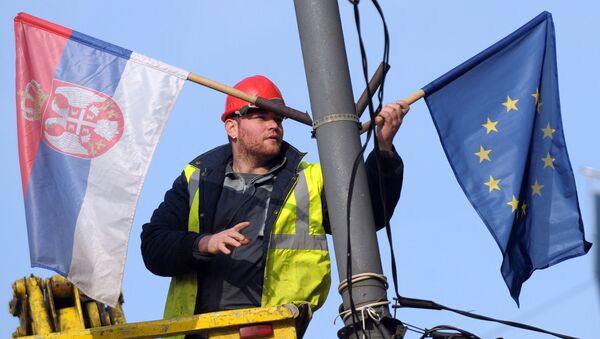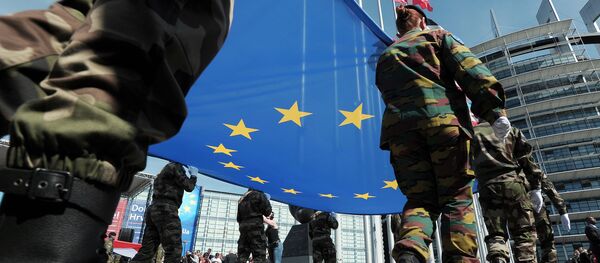The EU has earmarked more than 2 million euros for an information campaign in Serbia, including Kosovo, aimed at strengthening support for European integration.
According to a call for tender from the European Commission, the EU is planning to spend up to €1.37 million ($1.62 million) on a media campaign in Serbia and €900,000 ($107,000) in Kosovo.
Slobodan Samardzic, Serbia's former Minister for Kosovo and Metohija, said that the PR campaign is a response to fading support for EU accession in Serbia.
In 2013, 51% of Serbs were in favor of joining the EU, a proportion which decreased to 47% by December 2016, according to Serbia's Ministry for European Integration.
"The fact is that the popularity of the EU in Serbia is falling, which is noticeable even from the announcements made by some official figures," Samardzic told Sputnik Srbija.
"With their policies and propaganda, a few years ago they persuaded residents that Serbia will be a member of the EU, and as time goes on that is still further and further from reality. Now they want to restore that trust, which they are doing in the wrong way, via a propaganda campaign."
"It all depends on the program. It would not be manipulative if the EU spoke realistically, not in superlatives, and if the prospects for membership were talked about realistically. However, I suspect that this is about persuasion of the advantages, not an even discussion of the advantages and disadvantages. Because today, while there are advantages for cooperation with the EU, there are also major shortcomings," Samardzic said.
Nikita Bondarev, Associate Professor at the Russian State University for the Humanities' Faculty of International Relations, told Sputnik that the EU's renewed efforts also reflect the US' changed priorities in the Balkans and the unresolved status of Kosovo and Metohija.
"US Vice President Mike Pence in Montenegro talked about a Russian coup attempt in that country, Senator Ron Johnson in Serbia warned that diplomatic immunity for the employees of the Serbian-Russian humanitarian center was impermissible. The Americans in the Balkans are talking less about the problems of the region itself, and more and more about the Russian connection. This means that Washington is only interested in this region as an arena of confrontation with Russia, Trump has no strategic interests here."
"The EU, Germany that is, understands that the US presence in the Balkans is diminishing, and is also aware of the fact that 'nature abhors a vacuum.' Fearing the expansion of Russian influence, the EU is ready to allocate a lot of money for an information campaign."
"The decision to allocate funds [for an information campaign] should be considered in the context of the 'internal dialogue on Kosovo' announced by Serbian President Alexander Vucic. Thus the EU, that is, again, above all Germany, wants to change Vucic's position on the non-recognition of Kosovan independence via increased influence on public opinion. And, of course, Berlin is concerned about the fact that the number of supporters of European integration in Serbia is slowly but surely decreasing," Bondarev said.





